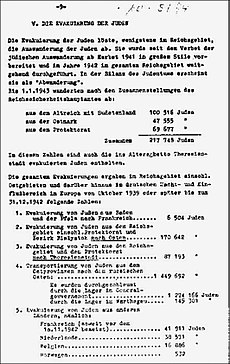Korherr Report
| Korherr Report | |
|---|---|
 Korherr Report, signed January 1943, page 9.
4. Deported to the Russian east: 1,449,692 Jews
| |
| Date | (as of) December 31, 1942 |
The Korherr Report is a 16-page document on the progress of
The decrease of Soviet Russian Jews from the territories overrun in
Significance
The initial report, sixteen pages long, was submitted on March 23, 1943. On Himmler's request an abridged version, six-and-a-half pages long, was updated to March 31, 1943.
Korherr ascribed this fall to "emigration, partially due to the excess mortality of the Jews in Central and Western Europe, partially due to the evacuations especially in the more strongly populated Eastern Territories, which are here counted as ongoing."[1]
By way of explanation, Korherr added that
It must not be overlooked in this respect that of the deaths of Soviet Russian Jews in the occupied Eastern territories only a part was recorded, whereas deaths in the rest of European Russia and at the front are not included at all. In addition there are movements of Jews inside Russia to the Asian part which are unknown to us. The movement of Jews from the European countries outside the German influence is also of a largely unknown order of magnitude. On the whole European Jewry should since 1933, i.e. in the first decade of National Socialist German power, have lost almost half of its population.[1]
Post-war
After the war Korherr was initially held in Allied custody but was one of the first to be released.[6] He was then hired at the West Germany Ministry of Finance. However, he was dismissed in 1961 when Gerald Reitlinger’s book Die Endlösung [The Final Solution] was published and it revealed the importance of the Korherr Report in crafting the "final solution."[7]
The Korherr Report's full impact was revealed at Adolf Eichmann's trial when he testified that the report made his job "much easier."[7]
Korherr denied all knowledge of the Holocaust, saying that he had "only heard about exterminations after the collapse in 1945."[8]
In a letter he sent to the German magazine Der Spiegel in July 1977, Korherr said that he had not written the report on Himmler's order"[9] and that the
statement that I had mentioned that over a million Jews had died in the camps of the
Lublin district.[9]
See also
- Jäger Report, 1941
- Einsatzgruppen reports, 1941–1942
- Wilhelm Cornides Report, 1942
- Wannsee Conference, 1942
- Katzmann Report, 1943
- Gerstein Report, 1945
- Riegner Telegram, 1942
- Einsatz Reinhardtarrivals, 1943
- Special Prosecution Book-Poland, 1937–1939
Notes
- ^ a b c d e Richard Korherr, DIE ENDLÖSUNG DER EUROPÄISCHEN JUDENFRAGE, Der Inspekteur für Statistik beim Reichsführer SS, Berlin, 1943. NS-Archiv.de in German.
- ^ Chris Webb (2009). "The Richard Korherr Report". Holocaust Research Project.org. Holocaust Education & Archive Research Team. Retrieved 16 March 2014.
- ^ Friedländer, Saul. "Chapter 7: March 1943 – October 1943". Nazi Germany and the Jews: The Years of Extermination, 1939-1945. p. 9.[permanent dead link]
- ^ "The Korherr Report! www.HolocaustResearchProject.org". www.holocaustresearchproject.org. Retrieved 2024-03-25.
- ^ Richard Korherr, Anweisung Himmler an Korherr, Der Reichsführer-SS, Feld-Kommandostelle 10.4.1943
- ^ "Korherr, Richard (1903-): statistical report on 'the final solution to the Jewish question' and other papers (microfilm) - Archives Hub". archiveshub.jisc.ac.uk. Retrieved 2024-03-25.
- ^ a b "GHDI - Document". ghdi.ghi-dc.org. Retrieved 2024-03-25.
- ^ Ernst Klee, Personenlexikon zum Dritten Reich,. Aktualisierte Ausgabe Frankfurt/M 2005, S. 331.
- ^ a b Der Spiegel, Der SPIEGEL, Nr. 31, 25. Juli 1977, S. 12. https://www.spiegel.de/politik/hitler-gegen-irving-a-04024ed2-0002-0001-0000-000040831720
References
- Korherr Report online
- Korherr Report, Nuremberg documents, NO 5192-4
- Korherr-Bericht, lange Fassung originals (German)
- Götz Aly, Karl Heinz Roth: Die restlose Erfassung. Volkszählen, Identifizieren, Aussondern im Nationalsozialismus. Frankfurt/M. 2005, ISBN 3-596-14767-0(germ.)
- ISBN 3-7678-0466-2
